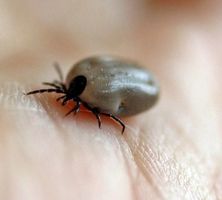|
by Dr. S. Dawn Dinger, DVM  In part one of this blog on vaccination, we discussed some general information and answered some frequently asked questions regarding vaccinations. In part II we will discuss the current recommendations for canine vaccinations and what diseases they are protecting against. Core vaccinations are considered vital for all dogs due to how common the disease is, the risk of exposure, the severity, or the potential risk to people. These include the DHPP (we will discuss what this means below) and the rabies vaccinations. There are also several other “non-core” vaccinations as well. These are vaccines that protect again diseases that may be less common in different areas of the country, or may be less of a concern depending on the life style of the pet. These include Leptospirosis, Lyme Disease, Bordetella and Canine Influenza. It is important to note that these diseases do not necessarily cause less severe disease. So what exactly are these diseases and how do they affect our pets?  1) DHPP: the letters of this vaccination stand for the individual diseases that this combination vaccine protects against. D = Distemper: a highly contagious and very serious virus of dogs (and some wildlife) spread by aerosol and direct contact with infected animals or contaminated objects. It can lead to pneumonia, severe vomiting and diarrhea and seizures. It is often fatal and those dogs that do survive may have permanent neurological damage. Vaccination is recommended for all dogs and puppies. H = Infectious Canine Hepatitis: also highly contagious this virus leads to acute liver failure, but can also affect the lungs, GI tract, kidneys and eyes. This infection can be fatal and vaccination is recommended for all dogs and puppies. P = Parvovirus: Highly contagious, this virus is spread from dog to dog by secretions and lasts for at least 6 months in the environment. Signs include severe vomiting, bloody diarrhea, greatly decreased white bloods cells (which fight infection), fever, severe dehydration and sometimes death especially in puppies. Vaccinations is recommended for all dogs and puppies. P = Parainfluenza: part of the “kennel cough” complex, this virus affects the respiratory tract and typically leads to coughing, fever, nasal discharge and lethargy. It is usually included in the “core” vaccinations that all dogs and puppies receive. 2) Rabies: This is a fatal viral infection of all mammals, including humans. It is spread via saliva and attacks the central nervous system leading to behavioral changes and paralysis. There is no treatment once signs develop. Unfortunately, there is also no way to test for rabies on a live animal – if rabies testing is required, for example if an unvaccinated animal bites someone or develops suspicious neurologic signs, this test must be performed on brain tissue. Vaccination is recommended for all dogs and puppies over 12 weeks of age and is typically required by law in most states, including Pennsylvania.  3) Leptospirosis: Caused by a bacterium, this disease leads to fever, lethargy, joint pain and kidney and liver failure. It is also “zoonotic” - meaning people can get this as well. It is spread by direct contact, especially with urine of other dogs and wildlife and is often found in contaminated water and soil. Although not considered a “core” vaccine, leptospirosis vaccination is typically recommended at GVVH due to the high amount of leptospirosis we have in the area and the potential severity to both pets and people. 4) Lyme Disease: A tick-borne disease which can lead to limping, joint pain and kidney disease. In 2015 Pennsylvania had the highest number of confirmed Lyme cases in people in the United States and the 2nd highest in dogs. Due to the high incidence of the disease here, we typically recommend vaccination for dogs and puppies.  4) Bordetella: Part of the “kennel cough” complex, this virus affects the respiratory tract and typically leads to coughing, fever, nasal discharge and lethargy. If your dog has any potential exposure to other dogs, for example at boarding kennels, dog parks, groomers, training classes or dog shows, this vaccination may be recommended. Also note, that many boarding kennels require this vaccination as well. 5) Canine Influenza: A relatively newly recognized disease, the “dog flu” leads to respiratory illness ranging from a mild cough to severe pneumonia. It is highly contagious and is easily spread from dog to dog via aerosol and contaminated objects. The same groups of dogs that are recommended to be vaccinated against Bordetella, will also likely benefit from the Canine Influenza vaccine. Some boarding kennels are beginning to require this vaccination as well.  Rest assured that at their annual wellness appointment, we will review your dog's lifestyle and overall health and make vaccination recommendations tailored to your pet so that he or she will remain healthy and happy members of your family. In the final part of this blog on vaccination we will discuss the diseases and recommended vaccinations for our feline friends. Stay tuned….
8 Comments
Thanks a lot- Dr. Dawn, for revealing such a factual enlightenment about canine vaccination. This inoculation plays a key role in protecting your puppy from severe infectious ailments. Distemper, parvovirus, adenovirus, leptospira, rabies, parainfluenza are some of the considerable canine diseases that can cause severe illness. In fact, these infirmities are also difficult to heal. But by keeping up with right vaccination schedule, you can keep your furry friend safe from being infected by these lethal abnormalities. Another thing is, a normal human-being cannot determine the right immunization schedule and vaccine for his pup. So, he must consult an efficient veterinarian while going to vaccinate his puppy.
Reply
Reply
6/20/2022 12:51:00 am
Knowledge about vaccinations is essential for us. Thank you.
Reply
Leslie Lee
10/18/2022 09:11:36 am
All mammals, including humans, are fatally infected by this virus.
Reply
Mark Henry
3/26/2023 08:47:14 am
Reply
10/22/2023 08:01:41 am
Dog groomers in Calgary often participate in ongoing training and professional development to stay updated on the latest industry trends and safety protocols. This dedication to education reflects their commitment to providing the best possible service to their furry clients. Whether it's learning about new grooming techniques or staying informed about emerging pet health issues, these groomers are always striving to improve their skills and knowledge.
Reply
Vaccination schedules vary based on the type of pet, their age, health status, and the local environment. Veterinarians typically create personalized vaccination plans for each pet to ensure they receive the necessary immunizations at the right times. Keeping up with these vaccinations helps protect pets from serious and sometimes life-threatening diseases while also preventing the spread of certain illnesses among animals and potentially to humans as well. Regular veterinary check-ups are essential for maintaining a pet's vaccination schedule and overall well-being.
Reply
Leave a Reply. |
AuthorsDr. S. Dawn Dinger, DVM Archives
May 2017
Categories |
 RSS Feed
RSS Feed